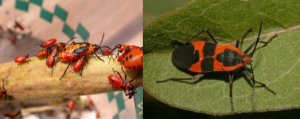READY TO GET STARTED?
REQUEST A FREE ESTIMATE
Fill out the form below or call (888) 466-7849 for a free, no-obligation estimate.
It’s a bird! It’s a plane! It’s a…MOSQUITO?!?!
Yes, that is right mosquito season is here! And although we all enjoyed the mild winter, we may not be able to say the same this summer. Mild winters usually mean an influx in pest pressure for Pest Management Professionals and their customers…including mosquitoes.
There are currently 63 different species of mosquitoes found in GA. Approximately$125,000,000 is spent annually in Georgia in an effort to reduce and treat the effects of disease and nuisance caused by mosquitoes. That’s a lot of money to control one insect. But is there a cost to protect the public’s health? Because the mosquito has become a big threat!
Worldwide malaria remains the most important human disease transmitted by mosquitoes. Malaria counts for almost 2 million deaths each year and is estimated that there are over 400 million cases in the world. In Georgia, we see about 50 to 60 cases of Malaria a year. Although Malaria affects the most humans worldwide there are two other diseases that we see more frequently in Georgia.
The West Nile virus was first found in the states in 1999. In 2002, the virus spread over most of the United States and caused over 4,000 cases and 277 deaths. The virus is transmitted from the mosquito to a host bird, where the virus grows and then is transmitted to an incidental host (humans) by another mosquito. To date, there is no antivirus for those affected with the disease.
Another common disease doesn’t affect humans directly but it does affect the family dog. Dog heartworms are a serious problem and are spread by mosquitoes. Infection rates in some states have been reported to be as high as 80% in dogs over 2.5 years old, and almost 100% in dogs over 5 years old that are left un-vaccinated. There is approximately $60,000,000 being spent on heartworm prevention in Georgia each year and it cost nearly $1,000 to treat a case of heartworms. Bottom-line…make sure you treat your dog for heartworms BEFORE it’s an issue.
So what can we do? Mosquito prevention at Northwest Exterminating is a five step program following the basic principles of an Integrated Mosquito Management program:
It is important as homeowner’s that we do our part. Here are some simple steps to help reduce mosquitoes around your home:
For more tips like these and to help reduce the amount of mosquitoes around your home call Northwest Exterminating. Our goal is to create a healthier environment around your home so you can enjoy your yard!
Adam Vannest
Director of Pest Services
Northwest Exterminating
[email protected]
It’s a bird! It’s a plane! It’s a…MOSQUITO?!?!
It is important as homeowner’s that we do our part. Here are some simple steps to help reduce mosquitoes around your home:
For more tips like these and to help reduce the amount of mosquitoes around your home call Northwest Exterminating. Our goal is to create a healthier environment around your home so you can enjoy your yard!
Adam Vannest
Director of Pest Services
Northwest Exterminating
[email protected]
 This past weekend I was outside working in the garden when I came across a few unwanted guests. There were a few spiders, a couple ground beetles, and a large amount of ants. The ants and beetles were present because my garden provides them with a large amount of food and water. The spiders were there because my garden provides them food (the other insects).
This past weekend I was outside working in the garden when I came across a few unwanted guests. There were a few spiders, a couple ground beetles, and a large amount of ants. The ants and beetles were present because my garden provides them with a large amount of food and water. The spiders were there because my garden provides them food (the other insects).
As most of you know the most common insecticides should not be used in gardens. Leaving the everyday gardener to reach out to “over the counter” products from their local nursery or hardware store to help rid them of pests. Although many of these products are effective for short periods of time, they require a minimum time lapse before you can harvest your yield. As many of you know, at Northwest Exterminating we care about protecting your family from pests in the most natural ways possible. And when it comes to the family garden our service technicians are trained to stop the pest before they enter the garden area. That being said, a lot of the garden insects start in the garden area and never leave it – making it hard to control them. So what can you do? Below I have listed some natural ways to help assist you in keeping the pest populations down in your family’s garden this growing season. Following these steps and methods will ensure a healthy garden with minimal pesticide use.
Environmental Tips:
Natural Plantings You Can Add To Help Keep The Pests Down:
We hope some of these tips help you keep your family garden healthier this season! For more information on Northwest’s Pest Control and Lawn Care Services visit us at callnorthwest.com
Adam Vannest
Director of Pest ServicesNorthwest Exterminating
[email protected]
 This past weekend I was outside working in the garden when I came across a few unwanted guests. There were a few spiders, a couple ground beetles, and a large amount of ants. The ants and beetles were present because my garden provides them with a large amount of food and water. The spiders were there because my garden provides them food (the other insects).
This past weekend I was outside working in the garden when I came across a few unwanted guests. There were a few spiders, a couple ground beetles, and a large amount of ants. The ants and beetles were present because my garden provides them with a large amount of food and water. The spiders were there because my garden provides them food (the other insects).
As most of you know the most common insecticides should not be used in gardens. Leaving the everyday gardener to reach out to “over the counter” products from their local nursery or hardware store to help rid them of pests. Although many of these products are effective for short periods of time, they require a minimum time lapse before you can harvest your yield. As many of you know, at Northwest Exterminating we care about protecting your family from pests in the most natural ways possible. And when it comes to the family garden our service technicians are trained to stop the pest before they enter the garden area. That being said, a lot of the garden insects start in the garden area and never leave it – making it hard to control them. So what can you do? Below I have listed some natural ways to help assist you in keeping the pest populations down in your family’s garden this growing season. Following these steps and methods will ensure a healthy garden with minimal pesticide use.
Environmental Tips:
Natural Plantings You Can Add To Help Keep The Pests Down:
We hope some of these tips help you keep your family garden healthier this season! For more information on Northwest’s Pest Control and Lawn Care Services visit us at callnorthwest.com
Adam Vannest
Director of Pest ServicesNorthwest Exterminating
[email protected]
Spring is a time when everything comes to life, blooming into an array of lovely colors. You’ll see flowers that are pink and purple, baby bunnies that are tan or gray and insects that are red and black. Just like every other little life form emerging this time of year, insects can also be a variety of colors and it’s important not to get them confused. Some bugs you might spot frequently are of the Georgia Bulldog variety – red and black spots, stripes and even a combination of both.
If any of these insects or other pests become too much of nuisance, Northwest Exterminating has the expertise and knowledge to take care of your bug problems. Our Director of Pest Services Adam Vannest has provided some information about these bugs that will help you know the difference and what measures to take against them.
– Overwinters
– Feeds on aphids
– Control Measures: exclusion and vacuuming for long-term prevention. When necessary, chemical contact treatments can knock down a population
Box Elder Bug
– Overwinters
– Female: Box Elder trees and Silver Maple trees serve as the primary host plant
– Control Measures: Exclusion and a contact/residual application around the foundation and base of host plant
Milkweed Bug
 – Found in gardens on Milkweed plants or around shelled sunflower seeds
– Found in gardens on Milkweed plants or around shelled sunflower seeds
– Control Measures: Over-the-counter garden insecticides
Leaf-Footed Stink Bug
– Feeds on a wide variety of host plants
– Besides birds, they do not have too many natural predators due to their taste and smell
– Control Measures: Over-the-counter insecticides for garden areas. Outside of the garden, any contact or residual product labeled for stink bugs
Wheel Bug
– Semicircular cogwheel-like crest on its thorax
– Feeds on a wide variety of insects including caterpillars, beetles, aphids
Control Measures: Prevention is the key! All plants should be inspected before they enter the home. Exclusion should be performed for long-term prevention. All vegetation should be trimmed away from the home, at least one foot. Pesticides are rarely needed